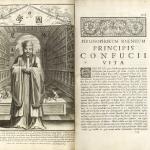
One of the most unusual saints from Russia (Rus), St. Alexander Nevsky (1221-1263), is famous in part for being a heroic protector of the Russian lands from various invaders, but is infamous because he acknowledged and defended the Tatar Yoke. There has been a lot of debate as to the reason why Alexander accepted the Tatar Yoke. Critics suggest many reasons, including the power they gave him by recognizing his royal position in Rus; his defenders believe that he was a pragmatist, trying to find a way to save the Russian people, allowing them to come together and slowly grow in self-assertion, biding their time until they could truly become independent from the Mongols.[1]
It is true, Alexander Nevsky offers us a complex, almost, paradoxical representation of Russian autonomy. He is celebrated for the way he defended Russian lands from Teutonic forces (even if much of that fame has been exaggerated). On the other hand, his willingness to work with, and even defend, Mongol rule against all its opposition (he was willing to turn in his brother to the Mongols because his brother was inspiring a revolutionary conspiracy against their rule), seems to go against any form of Russian triumphalism. How can he be, as he has become, an inspiring heroic figure of Russian nationalism when he was willing to subvert nationalistic independence? It is because he was able to hold the Russian people together, to allow them to slowly build themselves up, because his acquiescence to the Mongols actually freed the Russians from many harsh burdens which they would have otherwise faced if they stood strongly against the Tartar Yoke. Officially, he became viewed as a savior of the people (and their Orthodox faith) because his pragmatism had a long-term positive effect. Nonetheless, it must be acknowledged that many who lived during his reign could have and would have had reasons to question his political strategies.
St. Alexander Nevsky was not unique. Many in Orthodox history followed similar forms of pragmatism. When the Turks took over Constantinople, agreements were made between the Christians and the Turks, and the Turks were active in the appointment of the Patriarchate. While, once again, many questioned the wisdom of this, fearing the Turks would unduly influence Orthodox theology and politics, it remains an example of the pragmaticism which the Christian East has often had to face and the deals they have had to make in order to retain some level of religious freedom. We have seen this in recent more times when the official Russian Orthodox hierarchy made deals with Communist authorities. While many Catholic and Orthodox alike questioned the loyalties of a hierarchy which made deals with the KGB (which led to many of the hierarchy to have connections with the KGB), it still served as a basis by which the Russian Orthodox were able to endure during a time of religious hostility. And if pressed, the Christian tradition could point out that this is not something new; is it not similar to what we read of Daniel, Shadrach, Meshach, and Abednego and their relationship with the Babylonian Empire under Nebuchadnezzar?
This tradition, this option, though controversial and riddled with problems, nonetheless remains an invaluable one throughout history; it has had enough success to prove it is a possible option to consider when Christian have to relate to and deal with potentially hostile non-Christian authorities. They must not, of course, become complacent in their engagement, which sadly, happened in Communist Russia. What is vital is that we acknowledge that there can be value with such prudence. When grave injustice is committed or attempted to be enforced, then like Daniel, the response must be to resist such injustice, but when such rule does not, in and of itself, require such injustice by Christians, they can find a way to accommodate to the situation they find themselves in (instead of trying to avoid all such contact with the world, and hide in small little communities which form bubbles that will one day burst). The so-called Benedict Option has little to no real history to it, while options, like what we see with the Orthodox under Alexander Nevsky, while risky, have enough history behind them to indicate they have at least had a limited level of success.
It is in this light that I view the controversial agreements being made between the Catholic Church and China. The Pope is following a prudential and yet traditional approach as he tries to help Christians in China. Like Eastern Christian engagements with Mongols, Turks, and Communist Russia, the Vatican has a history of diplomacy working with hostile governments. Francis is not the first Pope to make such pragmatic deals. One can imagine what the outcries on social media would have been like against Pope St. Leo the Great because of his interaction with Attila the Hun. But, once again, that is history and people who would otherwise act in hostility if they lived through it themselves, know they cannot speak ill against St. Leo today, so they tend to ignore his legacy and its implications to Papal diplomacy today.
We should learn the lessons of history, and understand present Vatican interactions based upon its past interactions with the world. We must recognize what is and it not implied by such diplomacy. The Pope is not indicating that he agrees with what is happening in China; rather, it is an acknowledgment of the real-world situation and how it would be better for Catholics to have some sort of official relations with China than it is to stand in constant hostility with Chinese authorities. This does not mean the deal is easy, nor that what we have today should be the end of all such deals, but without a starting point by which China can be encouraged to treat Christians (and people of other faiths) better, the situation would likely only get much worse. Thus, despite trying to work for better relations, the Pope is willing to criticize the abuses going on in China, and to remind Chinese authorities of the responsibilities they now hold as a result of their deal with the Vatican. The good which has been accomplished by the deal is rarely acknowledged by its critics but the Pope is right, it has helped the average Catholic in China, that they have better access to churches to worship, as those who were involved with the underground church can now be united with those involved with the official organization already approved by China. And yet, for those in China who have problems with the deal, the Pope affirmed their right to follow their conscience and make sure they do not themselves embrace ideologies which they feel is contrary to the Catholic faith.
There are many questions which can be raised by the recent Chinese-Vatican agreement, but to look at it apart from history, apart from traditional forms of Christian diplomatic options, is to misread the agreement itself. It is in this light many of those who try to find any and every reason to be critical of Pope Francis fail to understand their own history and how Pope Francis is being very traditional in his approach. One can think that, at this time, the pragmatic approach will not work; one can debate the prudence behind the deal, but such debates should not be based upon notions that Francis is betraying the Catholic tradition itself. Francis is continuing that tradition, following the ways Popes and Christians in previous eras dealt with similar diplomatic concerns. There is no heresy in what he has done; he might, of course, have chosen the wrong course; it is too soon to tell, but prudential mistakes, if they really are mistakes, are not heresies, nor are they a betrayal of the Catholic faith and its tradition.
[1] See John Fennell, A History of the Russian Church to 1448 (London: Longman, 1995), 124; Fennell himself is critical of this view, and thought Alexander Nevsky’s record showed no inclination to accept any criticism of the Mongols.
Stay in touch! Like A Little Bit of Nothing on Facebook.
If you liked what you read, please consider sharing it with your friends and family!













